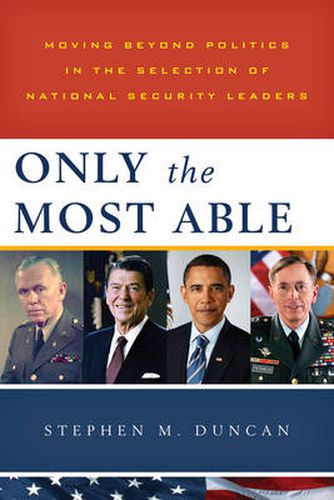Readings Newsletter
Become a Readings Member to make your shopping experience even easier.
Sign in or sign up for free!
You’re not far away from qualifying for FREE standard shipping within Australia
You’ve qualified for FREE standard shipping within Australia
The cart is loading…






The nature of the threats facing America today has drastically reduced the margin for error in senior political appointments. In Only the Most Able, Stephen M. Duncan draws on a lifetime of military, public service, executive, and legal experience to critique the political appointment process, focusing on departments that deal with national security-the Department of Defense and the Department of Homeland Security. He looks at how the current methods for making appointments put people in positions for which they are not qualified and not prepared. Rather, he argues, appointments should be made on the basis of one’s qualifications and merits-those who lead our military should be people with military experience, and those who must make executive decisions should be people who have served and excelled in an executive capacity. Identifying the successful traits of leaders such as Winston Churchill, General George Marshall, nationally-known business executives, and others, Duncan argues with unusual insight and candor why the quality and performance of senior political appointees who are charged even in part with the nation’s security, must be improved, and offers specific recommendations on how this can be accomplished. This timely book will appeal to Americans of all political persuasions, as well as those with particular interests in political and military history.
$9.00 standard shipping within Australia
FREE standard shipping within Australia for orders over $100.00
Express & International shipping calculated at checkout
Stock availability can be subject to change without notice. We recommend calling the shop or contacting our online team to check availability of low stock items. Please see our Shopping Online page for more details.
The nature of the threats facing America today has drastically reduced the margin for error in senior political appointments. In Only the Most Able, Stephen M. Duncan draws on a lifetime of military, public service, executive, and legal experience to critique the political appointment process, focusing on departments that deal with national security-the Department of Defense and the Department of Homeland Security. He looks at how the current methods for making appointments put people in positions for which they are not qualified and not prepared. Rather, he argues, appointments should be made on the basis of one’s qualifications and merits-those who lead our military should be people with military experience, and those who must make executive decisions should be people who have served and excelled in an executive capacity. Identifying the successful traits of leaders such as Winston Churchill, General George Marshall, nationally-known business executives, and others, Duncan argues with unusual insight and candor why the quality and performance of senior political appointees who are charged even in part with the nation’s security, must be improved, and offers specific recommendations on how this can be accomplished. This timely book will appeal to Americans of all political persuasions, as well as those with particular interests in political and military history.